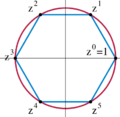Janko group
| Algebraic structure → Group theory Group theory |
|---|
 |
In the area of modern algebra known as group theory, the Janko groups are the four sporadic simple groups J1, J2, J3 and J4 introduced by Zvonimir Janko. Unlike the Mathieu groups, Conway groups, or Fischer groups, the Janko groups do not form a series, and the relation among the four groups is mainly historical rather than mathematical.
History
Janko constructed the first of these groups, J1, in 1965 and predicted the existence of J2 and J3. In 1976, he suggested the existence of J4. Later, J2, J3 and J4 were all shown to exist.
J1 was the first sporadic simple group discovered in nearly a century: until then only the Mathieu groups were known, M11 and M12 having been found in 1861, and M22, M23 and M24 in 1873. The discovery of J1 caused a great "sensation"[1] and "surprise"[2] among group theory specialists. This began the modern theory of sporadic groups.
And in a sense, J4 ended it. It would be the last sporadic group (and, since the non-sporadic families had already been found, the last finite simple group) predicted and discovered, though this could only be said in hindsight when the Classification theorem was completed.
References
- ↑ Dieter Held, Die Klassifikation der endlichen einfachen Gruppen (the classification of the finite simple groups), Forschungsmagazin der Johannes Gutenberg-Universität Mainz 1/86
- ↑ The group theorist Bertram Huppert said of J1: "There were a very few things that surprised me in my life... There were only the following two events that really surprised me: the discovery of the first Janko group and the fall of the Berlin Wall." [1]
| |
This article includes a list of related items that share the same name (or similar names). If an internal link incorrectly led you here, you may wish to change the link to point directly to the intended article. |
 |

